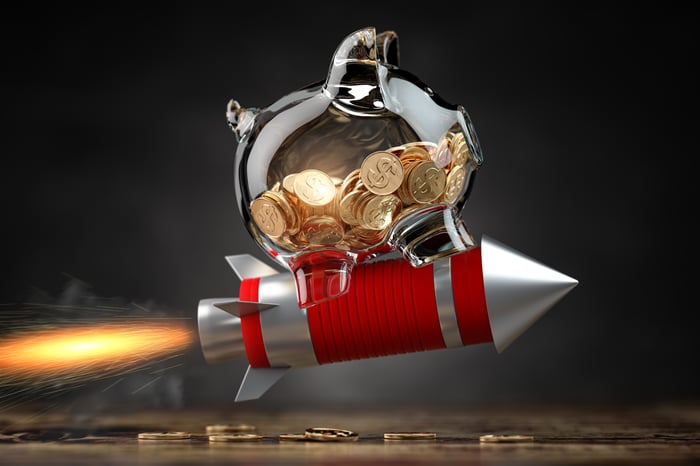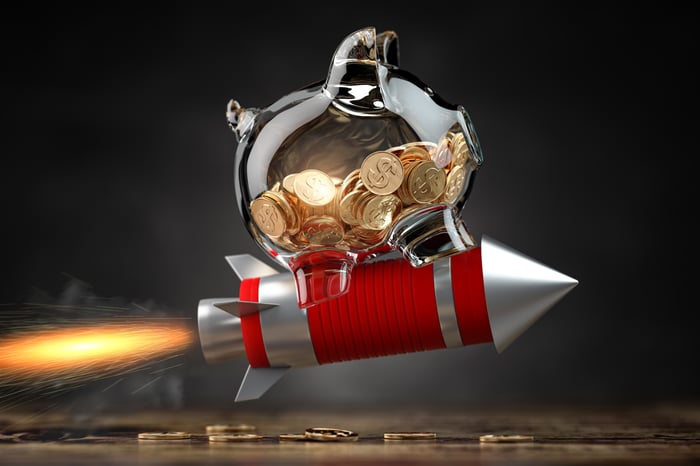QuantumScape vs. NuScale Power: A Tale of Two Disruptors
QuantumScape (NYSE: QS) and NuScale Power (NYSE: SMR) aim to transform traditional energy sectors with innovative technologies. QuantumScape is working on solid-state batteries that have the potential to replace lithium-ion batteries, while NuScale is focused on small modular reactors (SMRs) that could change the face of nuclear power.
Both firms went public through mergers with special purpose acquisition companies (SPACs). QuantumScape’s stock debuted at $24.80 in November 2020, skyrocketing to an all-time high of $131.67 shortly after. However, it currently trades at approximately $5. In contrast, NuScale’s shares started at $10.70 in May 2022, dropped to as low as $2 in November 2023, and are now around $21. This article will explore why investors shifted away from QuantumScape while favoring NuScale, and whether NuScale remains a more attractive option.

Image source: Getty Images.
Struggles with Revenue: QuantumScape’s Long Road Ahead
QuantumScape’s solid-state lithium-metal batteries utilize solid electrolytes, making them less volatile and quicker to charge compared to traditional lithium-ion batteries. However, they are more complex and costly to produce.
The first battery model, the QSE-5, offers an energy density of over 800 Wh/L (watt-hours per liter), exceeding the average 300 to 700 Wh/L found in lithium-ion batteries, and can charge from 10% to 80% in under 15 minutes. It began producing and shipping low-volume samples of the QSE-5 in the third quarter of 2024.
Despite its promising technology, QuantumScape cannot scale up production until it transitions from its current “Raptor” process to the more advanced “Cobra” process. This upgrade, aimed at improving cell reliability and production efficiency, is expected to be completed by 2025, with mass production of commercial batteries anticipated to begin in 2026.
As a result, analysts predict that QuantumScape will incur nearly $500 million in net losses per year during 2024, 2025, and 2026. They project its first revenue of about $7 million in 2026, coinciding with the shipping of its initial commercial batteries.
Backed strongly by Volkswagen, QuantumScape nevertheless faces stiff competition from companies like Blue Solutions, as well as major automakers such as Toyota Motor and Nio. The uncertainty surrounding its production ramp-up amid rising competition has contributed to a staggering 96% decline in its stock since reaching its peak. Even with this drop, QuantumScape’s enterprise value remains high at $1.9 billion.
NuScale’s Promising Future with Small Reactors
NuScale stands out as the only producer of SMRs that have received Standard Design Approval (SDA) from the U.S. Nuclear Regulatory Commission (NRC). Its small reactors are compact, measuring 9 feet in diameter and 65 feet tall, making them suitable for deployment in locations unsuitable for larger nuclear reactors.
NuScale’s modular designs are prefabricated and then assembled on-site, which helps to reduce costs and time. Currently, its NRC certification covers reactors that generate 50 megawatts of electricity. To compete effectively against coal-fired power plants, however, its reactor clusters must generate at least 77 megawatts. The company anticipates receiving NRC certification for these larger designs in 2025.
Although NuScale has grand plans, its increasing expenses led to the cancellation of six nuclear reactors under construction in Idaho last year, along with significant layoffs of approximately 40% of its workforce this year. These layoffs have drawn scrutiny from the U.S. Securities and Exchange Commission (SEC), which is investigating the company’s employment policies.
Despite these challenges, NuScale’s stock witnessed a rise over the past year as it gained new partnerships. Recently, it secured a supply deal with South Korea’s Doosan Enerbility for SMR components and received potential funding from the U.S. Department of Energy (DOE) to support the development of nuclear SMRs. Additionally, Amazon has teamed up with Energy Northwest to develop four advanced SMRs to meet its growing energy demand.
Analysts forecast NuScale’s revenue to remain flat at $23 million in 2024 but expect a significant rise to $102 million in 2025. Despite this growth, NuScale remains unprofitable, and its current enterprise value of $2 billion suggests it could be valued at 20 times its projected sales next year.
NuScale Emerges as the More Attractive Investment
Both QuantumScape and NuScale present high-risk investment opportunities. However, if a choice must be made, NuScale appears to be the more reasonable option. It is generating revenue, faces less competition, and has identifiable growth catalysts ahead. Meanwhile, QuantumScape’s future hinges on completing its expensive production upgrades before it can start bringing its batteries to market.
Is Investing in QuantumScape Worth It Now?
If you’re considering investing $1,000 in QuantumScape, here are some points to think about:
The Motley Fool Stock Advisor team has identified what they believe are the 10 best stocks to buy now, and notably, QuantumScape is not among them. The chosen stocks have the potential for significant returns in the coming years.
For example, when Nvidia was recommended on April 15, 2005, an investment of $1,000 would now be worth $822,755!*
Stock Advisor offers a straightforward plan for investors, with advice on building a portfolio, regular updates, and two new stock picks each month. Since 2002, the Stock Advisor service has more than quadrupled the returns of the S&P 500.*
See the 10 stocks »
*Stock Advisor returns as of December 16, 2024
John Mackey, former CEO of Whole Foods Market, an Amazon subsidiary, is a member of The Motley Fool’s board of directors. Leo Sun holds positions in Amazon. The Motley Fool has positions in and recommends Amazon. The Motley Fool also recommends NuScale Power and Volkswagen Ag. The Motley Fool follows a disclosure policy.
The views and opinions expressed herein are those of the author and do not necessarily reflect those of Nasdaq, Inc.








